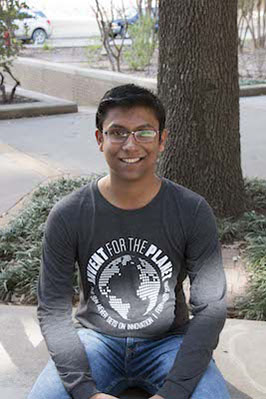
Texas A&M University graduate student Sarojeet Deb put his mechanical engineering knowledge to the test to seek new ways to illuminate education for children in poverty.
Deb joined a team of four other students, under the name Team Illumi-Nite, to compete in the Invent for the Planet challenge in February, which included more than 400 students from 14 universities across the globe. During the 48-hour global design challenge, teams selected a project from a list of needs that aimed at making the planet better. Deb’s team chose a challenge focused around light and education.
The need statement tasked students with designing a creative, inexpensive environment for multiple children to study in the evenings after the sun has gone down. Deb said he had a personal connection to the assignment from his time living in a suburb of Mumbai, India, in the early 2000s.
“Once a week we would lose electricity, and it used to annoy me a lot because if there was a test the next day I couldn’t study for it,” Deb said.
Illumi-Nite members developed a platform that can hold light-emitting diode (LED) lights for children in developing countries without access to electricity. The design allows children to create their platform using items that are easily found around the world, such as plastic bottles.
Along with the platform, Deb said the team worked on a cost analysis and a pamphlet of assembly instructions that came in six languages, which was an intentional decision.
“Everyone in the group is of a different ethnicity, so we have a lot of diversity in the group,” Deb said. “There’s also diversity in majors.”
The team consists of students in mechanical, general, industrial and electrical engineering, as well as a landscape architecture student. Reflecting on the event, Deb said he took away several lessons from the challenge.
“Each team member had expertise in a different area, so we learned how to distribute tasks between people,” Deb said. “I also learned that what looks good on paper does not mean it will be easy to manufacture or physically possible.”
Deb’s team won the grand prize, which was an opportunity to present at the VentureWell OPEN Minds Conference in Austin at the end of March. The prize also included a trip to Texas A&M, and the Engineering Entrepreneurship Program, who organized the event, decided to extend the invitation to the second-place team, Team Edu-LIGHTER, from the University of Technology in Yadanabon Cyber City, Myanmar, who was working on the same need statement. The goal is to have the two teams collaborate.
“We have a light delivery system, they have an electricity producing system,” Deb said. “So we have both ends covered, and when we put them together we have a complete solution to the problem.”
Deb said he thinks there is a high potential that the finished product will be manufactured one day.
“If we can convince investors that this invention is feasible and can actually be implemented, I don’t see any reason why they will not want to invest,” Deb said.
In general, Deb said his interest in mechanical engineering has developed over time. It started as a child watching his dad work as a mechanic.
“I had a lot of exposure to that from my childhood,” Deb said. “As I reached high school I liked physics, so taking mechanical engineering seemed like a natural choice.”
Deb received his bachelor’s degree in India and then traveled to the United States for his graduate program. After graduating he is interested in pursuing work in the thermal engineering industry.
“I want to learn for a couple of years and then take that expertise back to India and maybe have a company of my own in a few years,” Deb said.